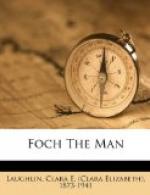And already it has been suggested that historians will write of this war: “It was not the allied armies, struggling hopelessly for four years, that finally drove the Germans across the Rhine, but Ferdinand Foch.”
But I am sure that Foch would not wish this said of him in the same sense that Napoleon said it of earlier generals.
For Foch has a greater vision of generalship than was possible to any commander of long ago.
His strategy is based upon a close study of theirs; for he says that though the forms of making war evolve, the directing principles do not change, and there is need for every officer to make analyses of Xenophon and Caesar and Hannibal as close as those he makes of Frederick and Napoleon.
But his conception of military leadership is permeated with the ideals of democracy and justice for which he fights.
One of his great lectures to student-officers was that in which he made them realize what, besides the route of the Prussians, happened at Valmy in September, 1792.
On his big military map of that region (it is on the western edge of the Argonne) Foch would show his students how the Prussians, Hessians and some Austrian troops; under the Duke of Brunswick, crossed the French frontier on August 19 and came swaggering toward Paris, braggartly announcing their intentions of “celebrating” in Paris in September.
Brunswick and his fellow generals were to banquet with the King of Prussia at the Tuileries. And the soldiers were bent upon the cafes of the Palais Royal.
Foch showed his classes how Dumouriez, who had been training his raw troops of disorganized France at Valenciennes, dashed with them into the Argonne to intercept Brunswick; how this and that happened which I will not repeat here because it is merely technical; and then how the soldiers of the republic, rallied by the cry, “The country is in danger,” and thrilled by “The Marseillaise” (written only five months before, but already it had changed the beat of nearly every heart in France), made such a stand that it not only halted Prussia and her allies, but so completely broke their conquering spirit that without firing another shot they took themselves off beyond the Rhine.
“We,” Foch used to tell his students, “are the successors of the revolution and the empire, the inheritors of the art, new-born upon the field of Valmy to astonish the old Europe, to surprise in particular the Duke of Brunswick, the pupil of Frederick the Great, and to tear from Goethe, before the immensity of a fresh horizon, this profound cry: ’I tell you, from this place and this day comes a new era in the history of the world!’”
It is that new era which Foch typifies—that new era which his adversaries, deaf to Goethe’s cry and blind to Goethe’s vision, have not yet realized.
It was “the old Europe” against which Foch fought—the old Europe which learned nothing at Valmy and had learned nothing since; the old Europe that fought as Frederick the Great fought and that had not yet seen the dawn of that new day which our nation and the French nation greeted with glad hails much more than a century ago.




